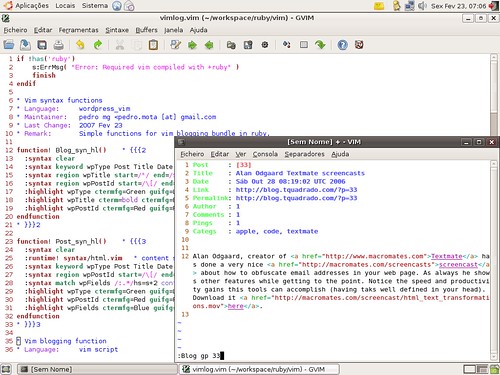
photo by Pedro mg
On the basis of what I read about blogosphere on wikipedia, I would like to analyse and to suggest you three interesting blogs. I found them particularly interesting not only for their contents but also for their different style and structure. While exploring the web, we can come across different kind of blogs which have specific purposes. They can pursue just an expressive aim, or even an informative or didactic aim.
- Contents: While searching for an interesting blog I tried to put in the tags different words such as ‘movies’, ‘celebrities’, ‘language learning’, ‘mythology’, ‘news’ and so on. I read through some pages and I discover that according to the matter you are looking for, the style and the register can vary considerably.
- Register and style: In this blog about news on foreign policy the language is very formal and the style is a typical journalistic style. The blog tries to give a broad but also concise overview of the main events in the world. It is frequently updated and it addresses a kind of audience who wants to be informed about facts.
An interesting blog I found about language learning is written I order to present some materials about language, culture, linguistic. In addition, the blogger give us some suggestion on how to choose the right language to learn.
The last blog deals with legends, mythology and stories. Actually, the only interesting story is that of Love and Psyche. Neverthless, I find this blog effective because of the language and the large amount of links you can find there.
- Authority: I think an authoritative blog is made up of good sources! I had a look at the bottom of the pages and I found out that the blog on news is written by a authoritative source, you can find the address, the telephone and the fax number of the people who published the blog. On the contrary, the blogs about language learning and mythology are written by bloggers whose name are Tracy Lewis and Brian Pagano; we know that Brian Pagano lives in NewYork- US but we don’t know anything else about Tracy except the name.
- What I found really interesting: I suggest you to have a look to these blogs because they clearly highlight the importance of being aware of what you read! I hope you will visit them and I’m looking forward to reading your observations!
Martina Urbani

6 comments:
Hi Martina,
Good work! I liked very much the presentation of the blog you chose. As a matter of fact, your description is short and concise and focuses on the main aspects of each blog. Your post is clearly structured. It is divided in short paragraphs and each one deals with a different topic.
I had a look to the blogs you suggested and I found them very interesting. I liked very much the one about news on foreign policy. Even though the blog deals with politics, the language is quite informal. As a matter of fact, the blog is aimed at non-specialized audience (however, if you want some extra information you can even find specialized articles). The articles are short and easy to understand.
I think that this blog is very useful in order to know what is happening in the world and to understand what are the relationships between countries. The process of global integration is changing our culture, our frame of mind but also our daily life. Therefore, it may be useful to discover how this process works. I think that this blog is a good starting point!
As far as the structure of the blog is concerned, the eye-catching layout makes the blog easily readable As a matter of fact, this blog is well-structured and each article is preceded by a photograph or a graphic.
Thanks for your suggestion!
see you later
Silvia.
Hi Urbanimarty,
I've just had a look at your post, to your links and to the comment you left on my own post!
The first thing I want to tell you is that your post looks very professional, you've chosen very interesting and academic blogs, and your analysis is really well-done. However, I think that not many people had a look at your links because they were too academic and not very funny and friendly! Maybe you could have chosen an academic blog but also a "free time blog".
Even though we're in an academic environment, I think that the purpose of these lessons is also to try to use a more informal and familiar language in our own style...so in my opinion you should try to use a more personal and friendly register!
Notwithstanding this chunk of criticism, I must tell you that I really liked the blog about language learning, it was interesting and I started asking myself "Why did I choose English, Soanish and French?"
As for your comment on my post...well...even if you don't like Jane Austen, I agree with you about "Heart of Darkness", I love it too! I worked on it all along my last year at high school and I discussed it as the topic of my oral final exam!
Hope to hear from you soon with comments on my posts and blog!
Camilla
Hi Martina!
I have just read your post and your comment on my post! First of all, thank you for your suggestions…next time I will try to be more precise about the authors of the blogs and their authority!
I think that your post is very well structured; you used colours to highlight key words and you divided your post in paragraphs, according to different topics. You focussed on the main characteristics of each blog and you used a very clear and concise language.
I quickly visited the blogs you suggested us, and I found them very interesting! I found particularly useful the blog about language learning; it contains many links to posts that discuss the main problems when using English language. In the post “Which language to learn?”, the author explains the main characteristics you should consider when choosing a language to learn: desire, difficulty, usefulness, location, regularity and personal aesthetics. These features were also at the base of my choice to study English and German.
I agree with Silvia in saying that the post “Comma Confusion” is a bit confusing and oversimplifies English rules of punctuation.
See you on Monday!
Veronica
Hi Marty,
how are you? I looked at the blogs you suggest us in your post, and my first thought was: “Wow, what a highbrow girl is Martina!”; as a matter of fact, all your blogs concern thoughtful topics: foreign policy, language learning, mythology, …
Of course, the one that mostly drew my attention is the one about language learning! I read some posts, such as ‘Which Language To Learn?’ and ‘Comma Confusion’; I found the former really interesting because the criteria suggested by the writer reflect almost completely those I considered when I myself chose what languages to study, but I found the latter a bit confusing…I’ll try to explain you why and I’d like to know your opinion about it!
In that post (‘Comma Confusion’), the author, Brian Pagano – who seems to be really interested in Linguistics – writes some rules on the usage of commas, but I am a bit sceptic about them. For example, he says that a comma must be used “Anytime you want to indicate a slight pause”, but I was wondering if this is true…really anytime you want…freely? What about, for example, the obligatory use of semicolon (and not comma) between two independent clauses if there is no conjunction linking them??? Or another rule he writes is “For a full stop, use a period”, but I would translate this sentence as follows: ‘Per ogni punto, usa un punto’; what on earth does it mean??? Look also at the following one: “Do not use a comma with "and" or "or". Use a comma with "but", which indicates a negation or exception to the previous clause”: I studied that a comma should be used between two independent clauses — above all if they are too long — when they are joined by coordinating conjunctions, such as ‘and, ‘but’, ‘or’, ‘so’, etc.!
I think that the author has oversimplified English rules on punctuation a bit…Do you agree? This could be a good example of how important authority is when reading a blog, as you have correctly pointed out in your post.
See you soon!
Elena V.
P.S. Sorry if I am pedantic, but if you have time, could you please reflect a little upon the reason why in rule 5 the author writes that a verb that ends in "-ing" is incorrectly called the "gerund" given that a gerund indicates a nominal form (not a verbal form)? I was convinced that gerund is a verbal mood…like indicative, subjunctive, conditional mood!
Hi Martina,
sorry but I had to delete my original comment because I realized that I had forgotten a '-s' for the third person...I know there will be so many mistakes but I could not bear to see such an awful slip!!!
Bye,
Elena
Post a Comment